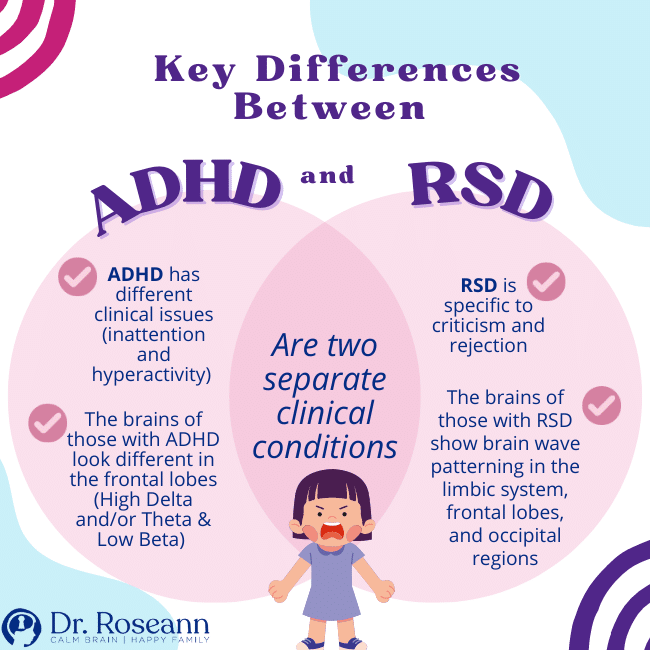Sometimes, we think that our children are too sensitive when they overreact to certain situations, especially when we’re giving them criticisms or feedback. However, there are cases when their reactions and sensitivity are due to a mental health disorder called rejection sensitivity dysphoria.
In fact, about 70% of those who have ADHD are also diagnosed with rejection sensitivity dysphoria (RSD). That’s why it’s important for us to learn more about rejection sensitivity dysphoria as it remains unknown to many.
Rejection sensitivity dysphoria is a clinical issue.
Most people don’t have any idea what rejection sensitive dysphoria (RSD) is, which is why we’re here to shed light on the matter because it is a newer issue that’s not included in the Diagnostic and Statistical Manual of Mental Disorders.
Rejection sensitivity dysphoria is a clinical issue wherein an individual exhibits overly emotional reactions to criticisms or rejections whether real or perceived. They usually get too worried about being rejected or criticized by others causing them to be avoidant.
What are the signs and symptoms of ADHD?
Attention deficit hyperactivity disorder or ADHD is a neurodevelopmental condition that greatly affects an individual’s behavior in many ways. Kids with ADHD have sudden outbursts and some situations overwhelm them easily.
Parenting becomes even more challenging when you’re parenting kids with ADHD and RSD. You have to have your A game parenting skills on and have everything together because these kids are very sensitive.
What are the signs and symptoms of RSD?
Sudden outbursts are the most common sign of RSD. Another is being emotionally overwhelmed all of a sudden. Kids with RSD often have low frustration tolerance which makes them easily triggered even by minor things.
Other than being easily angered or irritated, they have an intense fear of failure or rejection. They are prone to negative thinking and negative self-talk. This fear can be persistent which influences their emotions and behavior. This can also cause constant anticipation of negativity and self-doubt.
How is RSD different from ADHD?

ADHD is a clinical issue that involves impulse control issues, hyperactivity and inattention. An ADHD brain looks different as it tends to have more unfocused brain waves.
On the other hand, RSD is a specific behavior in relation to the fear of failure, criticism and rejection. An RSD brainwave activity looks different in the limbic system. There is overactivity occurring in the frontal lobes and low activity in the common area of simple reason.
How is RSD different from a mood disorder?
RSD and ADHD overlap at some point because of emotional regulation but mood disorder and RSD are more overlapping. In fact, symptoms of RSD such as sudden outbursts, low frustration tolerance and mood changes are also common to mood disorder.
However, the distinguishing characteristic of RSD is that it has a clear trigger but there doesn't always have to be a trigger because the brain gets itself into a state of being overwhelmed or withdrawn.
In relation to this, we also have to take into consideration other clinical issues like the sensory processing disorder (SPD). We all know that the trigger for SPD is a sensory trigger, whether it be a light, sound or touch, which causes children to have sensory meltdowns.
Cognitive reappraisal is a technique for your negative thinkers.
One of the strategies for managing emotional dysregulation is cognitive reappraisal which is a helpful technique for people who struggle with negative thinking. It restructures one’s way of thinking to change how one should respond to a situation.
The first step is to identify negative thought patterns and help yourself break those patterns. Although, it is important to note that you should never do this when someone is upset. If you plan on talking to your child, talk to them when they’re calm. And when they are, take a step back, help them assess the situation objectively and look for alternative and positive interpretations.
Remember not to shame them. You want to make sure that you clarify that you just want to help them out. This requires a lot of management and reinforcement; it’s not going to change overnight.
To help you and your kid calm the brain, we have a device called Calm PEMF which has significantly contributed to the positive development of our clients. We also conduct neurofeedback to help calm the brain. It is a science-backed treatment that has been proven effective by many of our clients. You can join our Natural Parenting Solutions group to know more.
For more information, check out my blog on Rejection Sensitive Dysphoria and ADHD
Links and Resources:
➡️ Join our FREE Natural Parenting Community to receive science-backed resources for your child and family. Join here.
➡️ Get help from Dr. Roseann and her team. Apply here.
➡️ “Is it ADHD or something else?” Take the quiz.








